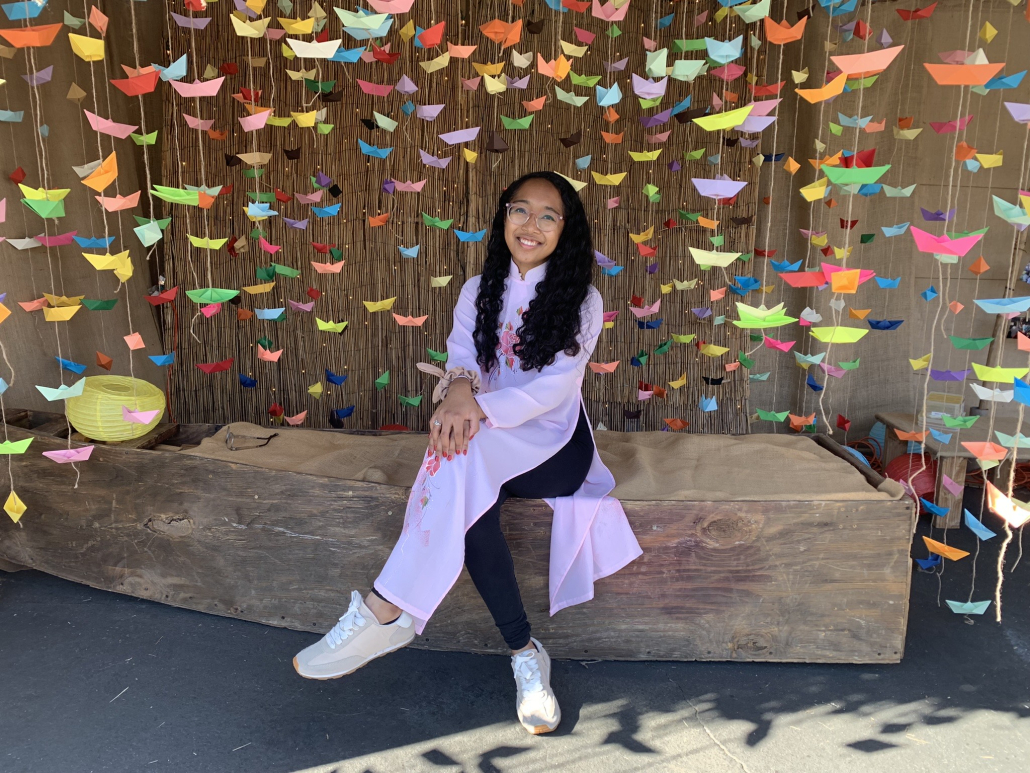USC alum finds belonging at Tết festival

For Kiara Nguyen, identity has always been a subject of contention. The USC alum, who graduated in May with bachelor’s degrees in psychology and NGOs and social change, identifies as half Black and half Vietnamese. Her mother, despite having lived in the United States all her life, was more often the one Nguyen found herself celebrating Tết, the Vietnamese Lunar New Year, with.
Nguyen’s father was born in Vietnam, but could only bring so much of his birthplace with him when he fled from the war at eight months old. What little he and his family did bring was shuttered away by generational trauma.
“I do have vague memories of us always going to my aunt’s house, and there’d be lots of food — but that was Asian parties in general,” said Nguyen, recalling that family members had still given her li xi, the iconic red envelopes, albeit during Christmas. “No one ever was like, ‘We’re going to your auntie’s house for Lunar New Year’ … but as I got older, and I started trying to connect more with my identity, I started celebrating it more.”
Connecting with her identity was, and remains, no small feat. Members of both the Black and Asian communities have rejected her, she said, for not being “Black enough” or not being “Asian enough.” The coronavirus pandemic, especially, marked a turning point for Nguyen’s relationship with her Vietnamese relatives. Following the killing of George Floyd in 2020 and subsequent nationwide protests, Nguyen found herself isolated by racist comments her Vietnamese family — whom she described as “conservative, Republican and pro-Trump” — made toward her.
At the end of the day, I am mixed … I am who I am. I deserve to belong in these cultural groups.
Kiara Nguyen, USC alum and founder of Artistas de Color Unidos
“My great-aunt was trying to tell me that other Black people have to worry, but not me,” she said. “I still don’t understand what she meant by that.”
Nguyen’s mother’s side of the family, she said, was hardly different: Nguyen recalled having a lengthy, heated argument with her aunt after the latter used an ethnic slur targeting people of Asian descent to refer to nail salon workers. When hate crimes against Asians soared during the pandemic — marked starkly by a mass shooting in an Atlanta spa killing six Asian women — Nguyen said she saw social media posts from peers who were Black saying, “Well, why should we care? Asian people are racist to us.”
Faced with racist tensions simmering on both sides of her family and within her community, Nguyen said she reached a breaking point.
“I just snapped,” she said. “I was like, ‘You know what? I don’t really need [this part of the community] anymore. You don’t get to choose which parts of me you accept.’ At the end of the day, I am mixed … I am who I am. I deserve to belong in these cultural groups.”
Nguyen said she sought out opportunities to respark her connection to Vietnamese culture, which she felt had been severed by her sparse knowledge of the language — her father had never taught her Vietnamese — and her isolation from the Vietnamese side of her family. She downloaded a language-learning app and joined the USC Vietnamese Student Association.
“No one [in VSA] really ever made me feel different for being mixed. Even though I was the only clearly Black person there,” she said, “it was always nice because it felt like I had a community.”
Last year, she donned áo dài, a Vietnamese traditional dress, and had her mother drive her to her first Tết festival.
“I actually saw a lot of mixed people at that festival, like interracial couples with their kids,” she said. “It made me excited because that’ll be me one day. It was nice to just see … people bring their kids to these things, reveling in their culture.”
Recently, Nguyen has immersed herself in her work, including at a nonprofit organization called Changeist, which has a mission of “bringing together 11-26 year olds to learn a common civic language, engage in dialogue, and build community to investigate local and global social justice issues.” She’s on track to become a teacher; in the meantime, she founded a multimedia platform — Artistas de Color Unidos — for emerging artists of color.
But the Lunar New Year is a time that brings Nguyen a “sense of calm,” she said, as she connects with her culture and her ancestors — and her mother.
“I’m her only daughter,” Nguyen said. “I guess she enjoys seeing me be happy and enjoying parts of my culture — it makes her happy.”

